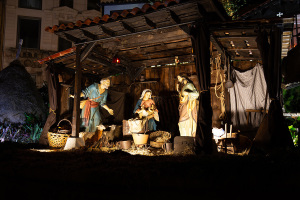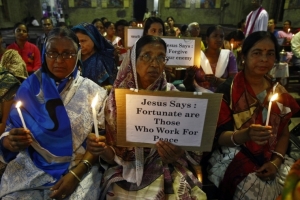Ask Chuck: The Power of Humble Generosity
To learn Biblical answers to your financial questions, you can #AskChuck @AskCrown your questions by clicking here. Questions used may be lightly edited for length or clarity.

Hello Chuck,
I love hearing stories of working class people who lived modestly but silently saved and invested over the years. Upon their deaths, people are shocked to learn of the sizable gifts given to different institutions. But I'm concerned about a recent report that charitable giving is down. Any insight?
Generous But Worried
Dear Generous,
Like you, I am always encouraged when I learn of humble people who have secretly stored away dollars to bless others. While it comes as a shock to their friends and neighbors, it really shouldn't shock us that the humble and frugal are also often the most generous.
I read a recent story about Sylvia Bloom, who worked at a law firm for 67 years and retired at the age of 96. During those years, her boss had her make stock purchases for him. After she had made the purchases for her boss, she would also buy a smaller amount for herself, trusting he knew what he was doing.
A child of the Depression, she and her husband, a NYC firefighter, teacher, and part-time pharmacist, lived modestly. At her death, she left some money to friends and relatives, but the bulk of her $9 million estate was directed to scholarships for the disadvantaged.
There are other similar stories of generous people living quiet lifestyles and leaving millions to a cause close to them. There are even greater examples that God give us in the Bible to follow. Remember early Corinthian church and how they gave "beyond their ability" even in the middle of extreme trial and generosity? They pleaded with the apostle Paul for the privilege of sharing with the Lord's people!
There are plenty of examples of generosity in the Old Testament as well. We read in Exodus about how the people of God brought more than enough in free will offerings for the construction of the Lord's sanctuary. They gave so much that Moses had to restrain the people from bringing more!
All of these examples have something in common. The givers lived modestly, sometimes in poverty. They didn't advertise their wealth or hoard it. They simply worked hard, saved diligently, planned long-term, and gave generously.
The problem I see today is that people aren't thinking properly about money. They may work hard but don't know how to spend properly so they can give, save, and invest. Many are loaded with consumer debt and student loans that hold them in financial bondage. Others, with mortgages too big for their budget, car loans, and untamed buying habits, desperately think things will grant them status or acceptance. Then there are others that earn a living but consume all of their limited resources on personal needs or wants.
What does God desire from us?
Work
Work was God's plan for man as recorded in Genesis 2:15. The Lord God took the man and put him in the garden to work it and keep it. Of course, the Fall impacted work. But when we use the gifts and talents He's given us, work can be very satisfying. It provides the means to sustain our families and can be a vehicle for our spiritual growth. Our work is where we often learn to trust God and depend on Him as we serve others. We glorify Him when we give Him our best effort.
As Paul told the Colossians, Whatever you do, work heartily, as for the Lord and not for men,knowing that from the Lord you will receive the inheritance as your reward. You are serving the Lord Christ.Colossians 3:23-24
Frugality
Christians need to remember that in light of eternity, we are only here a short period of time. We must live Kingdom-minded with gratitude for all God's provided. Humility comes when we recognize that all we have is because of His great mercy. We say no to things of today so we have money to invest for tomorrow. We have to be reminded daily that God owns all that we have.
Everything in the heavens and earth is yours, O Lord, and this is your kingdom. We adore you as being in control of everything. Riches and honor come from you alone, and you are the ruler of all mankind; your hand controls power and might, and it is at your discretion that men are made great and given strength.O our God, we thank you and praise your glorious name, but who am I and who are my people that we should be permitted to give anything to you? Everything we have has come from you, and we only give you what is yours already! For we are here for but a moment, strangers in the land as our fathers were before us; our days on earth are like a shadow, gone so soon, without a trace. (1 Chronicles 29:11-15 TLB)
Saving and Investing
Diligent saving over a period of time becomes a habit and impacts our lifestyle. Saving must be planned, investments must be studied.
In the Parable of the Talents, those who multiplied were commended by the master's words:
Well done, good and faithful servant. You have been faithful over a little; I will set you over much. Enter into the joy of your master. (Matthew 25:21)
We should live in such a way that we multiply what God provides whenever possible. Solomon gave us several tips.
The plans of the diligent lead surely to abundance, but everyone who is hasty comes only to poverty. (Proverbs 21:5 ESV)
Know well the condition of your flocks, and give attention to your herds, for riches do not last forever; and does a crown endure to all generations? (Proverbs 27:23-24)
Generosity
The Lord taught us that it is better to give than to receive. Like the examples of people who have lived modest, quiet lives planning to give to others rather than to consume their wealth on fleeting pleasures, we too should have such a plan. However, like the examples in the Bible, don't wait until you die to let go of your earthly treasures.
Make generosity your highest financial priority now. Put it into practice daily, weekly, monthly, and yearly. You will find that money loses its grip over your heart, you experience less stress, greater joy and by God's mysterious ways, you will find He has faithfully provided your every need. This example may not make the headlines but matters in eternity since God has the final say in whether we lived as generous or stingy.
Then the righteous will answer him, 'Lord, when did we see you hungry and feed you, or thirsty and give you something to drink? When did we see you a stranger and invite you in, or needing clothes and clothe you? When did we see you sick or in prison and go to visit you?
The King will reply, 'Truly I tell you, whatever you did for one of the least of these brothers and sisters of mine, you did for me. (Matthew 35: 37-40 NIV)





























